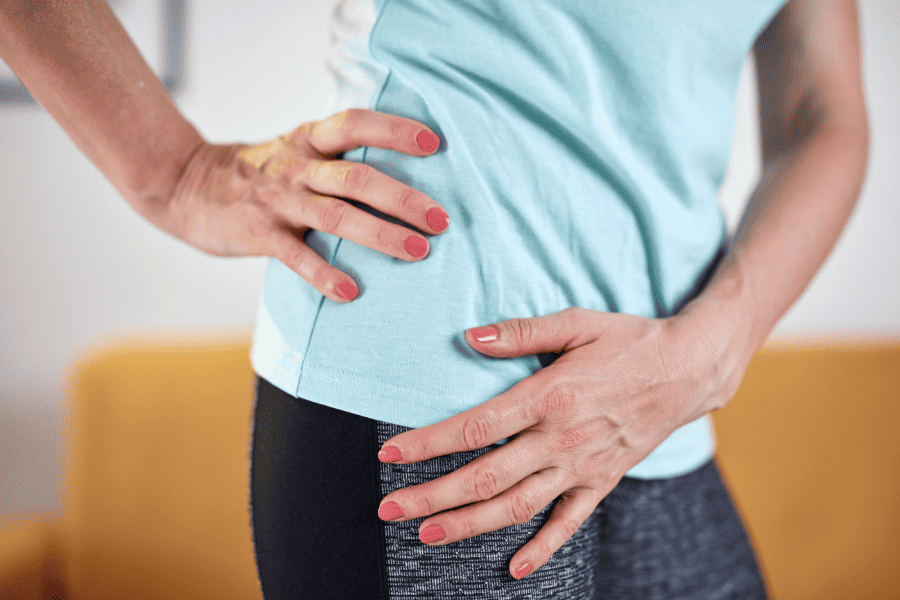
- Weight Management
- Medications
- Exercise and Physical Therapy
- Stretching and Flexibility
- Supplements and Alternative
- Hip Replacement Surgery
Are you experiencing symptoms of Osteoarthritis? You’re not alone. Over 30 million people in the United States suffer from hip osteoarthritis. This condition is a degenerative condition causing pain and stiffness in the joints.
In individuals with hip osteoarthritis (OA), the protective cartilage that cushions the joints undergoes wear and tear, leading to friction, bone damage, and inflammation. This process results in the manifestation of pain and stiffness. Have you ever wondered about the most effective strategies for managing hip osteoarthritis?
At Davis Orthopedics, we understand the challenges posed by hip osteoarthritis and are here to guide you through a comprehensive approach to care. Read on to learn more.
Weight Management
Individuals with an elevated body mass index (BMI) face an increased risk of developing osteoarthritis. The additional weight strains the joints, potentially contributing to inflammation. This combination of factors can exacerbate symptoms and accelerate the condition’s progression.
For those grappling with overweight or obesity, healthcare professionals strongly advocate weight loss as an important measure. Consulting with your healthcare provider can help determine the suitability of this option for you and, if applicable, the most effective approach to weight loss. They are likely to provide guidance on dietary modifications and recommend a tailored exercise program to support your weight management goals.
Medication
Effective pain relief medication can contribute to managing this condition in conjunction with exercise and weight management.
Individuals experiencing mild symptoms may find relief through over-the-counter oral nonsteroidal anti-inflammatory drugs (NSAIDs), including:
- Ibuprofen
- Acetaminophen
- Naproxen
For those with moderate to severe osteoarthritis (OA) of the hip, prescription pain relief may be necessary. Options like duloxetine or tramadol could be recommended. However, it’s crucial to note that, except for tramadol, healthcare experts advise against the use of other opioid medications due to the high risk of dependency.
Injections
Healthcare professionals might recommend steroid injections to alleviate the intense pain and swelling associated with hip osteoarthritis.
Steroids play a crucial role in pain management by reducing inflammation. However, it’s important to note that while they temporarily relieve pain, prolonged use may result in adverse effects.
Exercise and Physical Therapy
 Regular exercise is vital for diminishing the risk of osteoarthritis and impeding its progression. Exercise not only aids in weight management but also enhances strength, flexibility, and mobility.
Regular exercise is vital for diminishing the risk of osteoarthritis and impeding its progression. Exercise not only aids in weight management but also enhances strength, flexibility, and mobility.
Opting for low-impact exercises is beneficial for avoiding strain on a compromised joint. Experts highly recommend tai chi for people with hip osteoarthritis. Additional exercise options include:
- Yoga
- Cycling or utilizing a stationary bike
- Swimming or participating in water exercises
- Strength-building exercises
- Walking
If you’ve been inactive for an extended period, seek guidance from your healthcare provider or a physical therapist. They can assist in developing a customized program that suits your needs, minimizing the risk of injury.
Maintaining motivation is crucial for consistent exercise that promotes overall health. According to the American College of Rheumatology and the Arthritis Foundation (ACR/AF), exercising with a companion or a trainer and choosing activities you enjoy are recommended practices.
Stretching and Flexibility
Incorporating regular stretching into your routine can relieve stiff, achy, or painful joints. To ensure safe and effective stretching, consider the following tips:
- Seek suggestions and guidance from a physical therapist to tailor your stretches to your needs.
- Approach all stretches gently, gradually building up flexibility over time.
- Cease stretching if you experience any pain.
- Increase the intensity of your stretches gradually to prevent strain or injury.
- If you don’t experience pain in the initial days of an activity, progressively extend the duration of your stretches. Initially, reaching far may be challenging, but your flexibility will improve with consistent practice.
Explore these effective stretches to improve flexibility and relieve hip discomfort:
Forward Fold:
- Begin with your feet shoulder-width apart, or sit in a chair.
- Gradually lean forward, keeping your upper body relaxed.
- Feel the stretch in your hips and lower back.
Knee Pull:
- Lie on your back and pull your bent knee up toward your chest until you feel a stretch.
- If comfortable, use your other leg to enhance the stretch.
Always consult with your healthcare provider before initiating any hip stretches or exercises.
Self-care Routines
 Self-management is a crucial aspect of effectively addressing osteoarthritis. Take charge of your well-being by:
Self-management is a crucial aspect of effectively addressing osteoarthritis. Take charge of your well-being by:
- Dietary Choices: Make mindful choices, opting for fresh, whole foods and minimizing added sugar and fat.
- Physical Activity Level: Tailor your type and level of physical activity to support joint health.
- Tobacco and Alcohol Use: Limit or avoid tobacco and alcohol, as they contribute to overall health issues and may exacerbate inflammation.
- Comprehensive Care for Mental and Physical Health: Seek appropriate care for mental and physical health conditions.
- Establishing Healthy Sleep Habits: Cultivate regular sleeping patterns for optimal well-being.
Osteoarthritis can impact mental health, but proactive measures can mitigate the risks of depression and anxiety. Consider these self-care tips for relief:
- Prioritize Rest: Establish consistent sleeping habits and rest during symptom flare-ups.
- Manage Stress: Incorporate stress-relieving activities like exercise, meditation, or listening to music to enhance relaxation and mood.
- Adopt a Healthy Diet: Opt for a diet rich in fresh fruits and vegetables, promoting well-being and maintaining a healthy weight.
- Stay Connected: Engage with friends to alleviate stress and foster overall health, especially for activities like exercise.
- Limit Tobacco and Alcohol: Minimize or avoid tobacco and alcohol to address overall health concerns and reduce inflammation.
Supplements and Alternative Therapies
Exploring natural therapies is a path some individuals take to address hip arthritis, with potential benefits suggested by evidence for the following:
- Acupuncture: Traditional practices involving the insertion of fine needles at specific points may offer relief.
- Cognitive Behavioral Therapy (CBT): Behavioral therapy addresses thoughts, emotions, and behaviors to manage pain and improve overall well-being.
- Heat Pad Application: Applying heat pads to the affected area may provide soothing relief from arthritis symptoms.
- Topical Ointments with Capsaicin: Using ointments containing capsaicin, a compound found in chili peppers, has shown promise in offering localized warmth and potential relief.
Before considering these therapies, consulting with your healthcare provider is advisable to ensure their appropriateness for your specific situation.
Hip Replacement Surgery
If exercise, weight loss, and lifestyle measures prove ineffective, or if osteoarthritis (OA) significantly impacts your mobility or quality of life, your healthcare provider may suggest surgery. Available options include:
- Hip Resurfacing: The surgeon trims damaged bone and cartilage, capping them with a metal shell to create an artificial surface.
- Total Hip Replacement: The surgeon replaces the socket and the head of the femur with an artificial joint.
Hip replacement surgery offers potential benefits, such as:
- Improving pain levels
- Increasing mobility
- Lowering the risk of complications, such as hip dislocation
Your healthcare provider can guide you through the decision-making process, providing insights into the pros and cons of hip surgery to help determine its suitability for your situation.
Are you ready to take control of your hip osteoarthritis? Don’t let pain and stiffness dictate your life. Schedule an appointment with Matthew Davis, M.D., today. Your well-being is our priority, and together, we’ll pave the way for a healthier, more active future.
